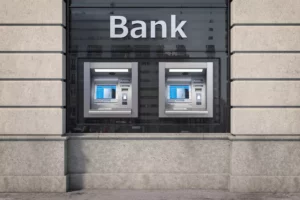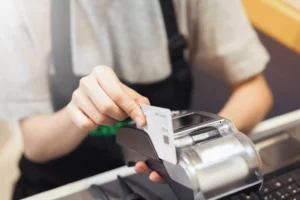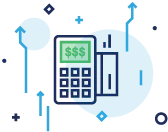
TABLE OF CONTENTS
- What is a Merchant ID (MID)?
- How Do Merchant ID Numbers Work?
- Why Your Business Needs a Merchant ID
- How to Get a Merchant ID Number
- Other Types of Payment IDs You Need to Know About
- Merchant ID Number Lookup: How to Find an Existing MID
- Can My Merchant Number Be Revoked?
- Protect Your Merchant Identification Number from Fraud
- Final Thoughts on Merchant ID Numbers
If your business accepts credit card and debit card payments, you may be overwhelmed with the numerous terms associated with payment processing. While it might happen instantly in your eyes, many systems are operating in unison when you process an electronic payment, thus many terms associated with the process. One such term is “merchant ID number.” This article dives deep into what a merchant ID number is and why it’s important for your business.

What is a Merchant ID (MID)?
A merchant ID number, or MID, is a 15-digit number that helps facilitate credit and debit card transactions in your business.[1]Business.org. “What Is a Merchant ID Number?“. Accessed March 25, 2022. Acting as a digital address to your business’s merchant account, this number is assigned to you by an acquiring bank or a payment processor.
Having the correct merchant ID number is essential if you want a customer’s funds to reach your merchant account after processing a credit card transaction, as this number tells the payment ecosystem where to send the money.
How Do Merchant ID Numbers Work?
You automatically receive a merchant ID number when you sign up with an acquiring bank or payment processing platform. When a transaction occurs, this number is sent to the payment processor. The MID number ensures the payment processor assigns the transaction funds to the correct merchant account.
Why Your Business Needs a Merchant ID
Your business needs a merchant ID number if you want to process credit and debit card transactions using a merchant account. Not having a MID number means a payment processing platform will have no digital address to direct your funds toward.
How does having a MID affect my business?
Having a merchant ID number allows you to process credit card and debit card transactions. United States consumers use credit cards more often than cash, so not having a merchant account is very costly. Facilitating credit card transactions is essential to improving your customer experience.
Does every business need a MID?
While having a merchant ID number is commonplace for most businesses, it’s not a necessity. If you’re a cash-only business, there’s no need to have a MID number. This is a number that is only associated with accepting debit and credit card payments.
However, not all payment processing platforms assign merchant ID numbers to their users. For example, if you’re simply using an eWallet, you might not receive a MID number. This means that it’s possible to accept some limited forms of credit or debit card payments without a MID number.
Also, some payment service providers, such as Square, do not provide merchant ID numbers to their clients.[2]Square. “Square Account FAQ“. Accessed March 25, 2022.
Can my business have more than one merchant ID number?
Yes. While it may seem strange to have more than one merchant ID number, this is fairly commonplace. If a business has more than one merchant account, it will have more than one MID number.
Each merchant account requires its own MID number. If you were to have the same number across multiple merchant accounts, the payment network would not be able to determine which merchant account receives the payment.
How to Get a Merchant ID Number
Obtaining a merchant ID number is easy. All you need to do is sign up for a merchant account through a payment processor, and you will receive a MID number.
If your payment processor doesn’t issue your business a MID number, ask for clarification. You likely have a MID number, even if it hasn’t been communicated to you.
Other Types of Payment IDs You Need to Know About
While a merchant ID number is one of the essential numbers to understand to gain a deeper knowledge of payment processing, there are other numbers to consider, too. One of which is the terminal ID number.

Terminal ID
A terminal ID number, or TID, is an identifier for your business’s payment terminal. Payment terminals are another critical element in the payment network. Your TID number ensures that the payment network understands the processed payment’s source.
If someone performs a “credit card merchant lookup,” they should be able to confirm which merchant and terminal are responsible for receiving the payment by the MID and TID numbers.
Merchant ID Number Lookup: How to Find an Existing MID
If you are trying to find your merchant ID number, there are a few places to look. Below are some of the most accessible places to find your MID number:
- Merchant statement: If you look at a recent merchant statement, there should be a 15-digit number in the top-right corner. This is your MID number.
- Bank statement: If you transfer money from your merchant account to your bank account, your bank statement may list your merchant ID number under each transaction. Typically, this will start with MTOT or BTOT.
- Payment terminal: In some cases, a payment terminal contains a merchant ID number. Make sure that this isn’t your terminal ID number when you’re searching for it.
- Contact your merchant account provider: Lastly, if you can’t find your MID number, you can always contact your payment processor or merchant service provider. This information is easy for them to source for your business.
Can My Merchant Number Be Revoked?
For business owners, losing access to a payment platform is a nightmare. And if you’re wondering if you can lose your merchant ID number, the answer is: Yes!
If a payment processing platform revokes your merchant account, you will no longer have access to your MID number.
A common reason businesses lose their merchant accounts and merchant ID numbers is the accumulation of too many chargebacks. Chargebacks occur when a customer files a refund request to their card issuer. If the chargeback is valid, the customer receives a refund.[3]CNBC. “What is a chargeback—and how to dispute credit card transactions“. Accessed March 25, 2022.
This can happen for a variety of reasons, including the following:
- A customer believes that your product or service is not as described
- You fail to provide a legitimate refund to a customer
- Someone used a stolen credit card and the true cardholder files a chargeback
- A cardholder doesn’t recognize your business name on their statement and files a chargeback by mistake
Not only do chargebacks result in your business refunding the cardholder and paying a chargeback fee, but they can also result in problems with your merchant account. If your chargeback rate is too high, your merchant account provider might designate your business as high-risk and rescind your account.
Additionally, if your payment processor suspects your business of fraud, it might revoke your MID number regardless of your chargeback rate.
Protect Your Merchant Identification Number from Fraud
If your merchant ID number becomes public knowledge, it can leave you open to fraud. Fraudsters may try to process fake transactions using your MID number if you don’t keep it secure.
Keep your MID number private, as there’s usually no reason to share this piece of information.
Final Thoughts on Merchant ID Numbers
Now that you understand the core elements of merchant ID numbers, it’s time to open a merchant account and receive your own MID number. Choosing a payment processing platform that offers merchant ID numbers ensures you access a full range of options for accepting payments. Not only will this help you improve your revenue, but it will also make paying for goods and services much easier for your clients!





